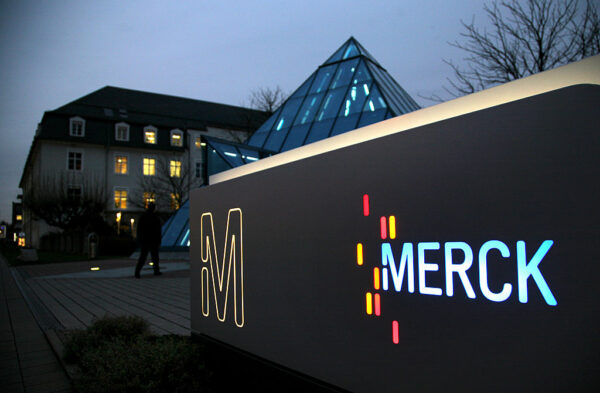
Drugs that interfere with a way tumors repair damage to their DNA have become valuable tools for treating certain cancers. Some big pharmaceutical companies are developing drugs that improve on this approach, and Merck KGaA is getting its contender by striking a deal with Jiangsu Hengrui Pharmaceuticals.
Per deal terms announced Monday, Merck KGaA will pay Hengrui €160 million (about $169 million) up front for global rights, except China, to HRS-1167, a small molecule belonging to a class of drugs called PARP inhibitors. Milestone payments could bring China-based Hengrui up to €1.4 billion ($1.48 billion).
PARP enzymes are key to DNA damage response, a mechanism for fixing the damage resulting from the rapid proliferation of cells characteristic of cancer progression. By targeting and blocking these enzymes, PARP inhibitors suppress DNA repairs, which in turn leads to genomic instability and ultimately, cell death. Lynparza from AstraZeneca and GSK’s Zejula blazed the trail for PARP inhibitors. Those commercialized drugs broadly address PARP enzymes to treat ovarian cancer, fallopian tube cancer, and primary peritoneal cancer.
Hengrui’s drug is a “next-generation” PARP inhibitor designed to be a more potent and selective blocker of the PARP1 enzyme. In Monday’s announcement, Merck KGaA said specifically targeting the PARP1 enzyme offers the opportunity to expand PARP inhibition in both established and new indications. The company points to Phase 1 data showing encouraging signs of clinical activity and patient benefit as a monotherapy. Merck KGaA also noted that compared with first-generation PARP inhibitors, HRS-1167 offers greater potential for use in combination with chemotherapy as well as novel cancer drugs. Hengrui’s drug is joining a Merck KGaA pipeline that includes programs addressing other targets in the DNA damage response cascade, such as ATR, ATM, and DNA-PK.
Gilead Sciences entered the chase for a selective PARP1 inhibitor earlier this year with the acquisition of privately held XinThera and its preclinical PARP1-targeting small molecules. According to Gilead’s most recent financial report, the company paid $170 million to buy XinThera. AstraZeneca is further ahead with AZD5305, a PARP1-blocking drug currently in Phase 2 testing as part of combinations that include Enhertu and datopotamab deruxtecan, two antibody drug conjugates (ADC) from its partnership with Daiichi Sankyo.
Merck KGaA’s Hengrui deal could also yield an ADC. The agreement grants the German company the option to license global rights, excluding China, to SHR-A1904. This Hengrui ADC addresses Claudin-18.2, a protein abundant in gastric, pancreatic, and esophageal cancers. Merck KGaA said the Hengrui asset is complementary to its own ADC portfolio, which uses different technologies to link the drug payload to the targeting antibody. Merck KGaA’s ADC M9140 is in early-stage clinical development in metastatic colorectal cancer.

The Power of One: Redefining Healthcare with an AI-Driven Unified Platform
In a landscape where complexity has long been the norm, the power of one lies not just in unification, but in intelligence and automation.
“This partnership with Hengrui fully aligns with both our external innovation ambition and our oncology research and development strategy by diversifying our robust internal pipeline in our focus areas of DNA damage response inhibition and antibody-drug conjugates,” Danny Bar-Zohar, global head of research & development and chief medical officer for Merck KGaA’s healthcare business, said in a prepared statement. “The synergies of these assets with our portfolio offer broad potential for development and the opportunity to advance more therapeutic options for patients with difficult-to-treat cancers.”
Photo: Hannelore Foerster/Bloomberg, via Getty Images








